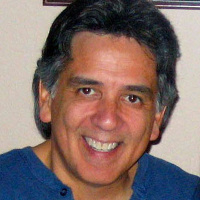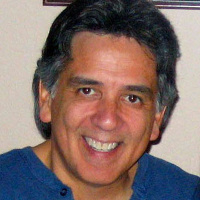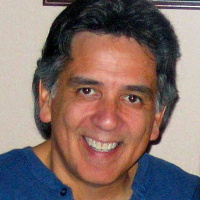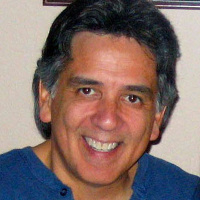Synopsis
Audio podcasts delivered at theeffect church in San Clemente, CA. theeffect is a community of imperfect people working together to find the emotional recovery and spiritual transformation that is theeffect of Gods love by unlearning limiting perceptions, beliefs, and compulsions, and engaging a first century Jesus in a non-religious and transforming way. See more at theeffect.org.
Episodes
-
Expressing the Inexpressible
31/01/2015 Duration: 48minDave Brisbin | 2.1.15 The Fifth Way Series 9: Chuang Tzu, a 3rd century BCE Chinese philosopher said: The purpose of a fish trap is to catch fish. Once the fish is caught the trap is forgotten. The purpose of a rabbit snare is to catch a rabbit. Once the rabbit is caught, the snare is forgotten. The purpose of words is to convey ideas. Once the ideas are grasped, the words are forgotten. Where can I find a man who has forgotten words? He is the one I want to speak with. To that I add: The purpose of theology is to catch God. Once God is “caught,” theology can be forgotten. To find a person who has forgotten theology is the goal of the Fifth Way of Jesus. Theology is our best attempt to express the inexpressible truth that is God, ultimately. Any theological truths we find along the Way can point to God, but are not God themselves, and in the light of God’s presence, if they are not forgotten, then we are not really seeing the light.
-
Beyond Theology
17/01/2015 Duration: 45minDave Brisbin | 1.18.15 The Fifth Way Series 7: One really ancient view of cosmology was of a flat earth resting on the back of an enormous turtle. What was the turtle standing on? Well, it’s basically turtles all the way down. As our minds struggle with the impossibility of an infinite stack of turtles, we are seeing the problem of theology. How can we possibly use finite language and physical rules of logic to describe something that by definition stands outside everything we can use to describe it? We long for one more turtle on which to stand, but eventually there is only the unseen God. We can’t prove God to one another, we can only prove him to ourselves…once we’ve moved beyond theology, once we realized that understanding theology is not knowing God. Jesus tells the story of workers who come to work first thing in the morning with a contract for a certain amount of pay and workers who come later in the day with no contract at all, just a promise of fairness. When all are paid the same, the contractual w
-
Between Heaven and Earth
10/01/2015 Duration: 50minDave Brisbin | 1.11.15 The Fifth Way Series 6: The ancient Hebrews who wrote our scriptures envisioned us humans living our lives between heaven and earth—between the pure connection and unity of God and the individual form and separation of the material world. And our job as humans was to bring heaven to earth and earth to heaven: to merge the two, bring the unity and connection of heaven into our daily lives while retaining the individual form by which we are recognized. To live this radical reality is not an intellectual task as much as an experiential one. No one can give us the answers, we must live with such purpose until we know truth. Jesus tries to illustrate just this way of living with unity and disunity in one embrace in his parable of the wheat and the tares, because life between heaven and earth is much less about learning to pull weeds as it is about learning to accept the imperfections in life and ourselves and not allowing them to keep us from moving toward the harvest.
-
Four Soils
03/01/2015 Duration: 39minDave Brisbin | 1.4.15 Called to lead a study group at a treatment facility, I found myself in front of about 20 women I’d never met before to talk about the intersection of faith and life and scripture. Immediately I saw a few who were not interested at all, another few who were interested for while then mentally checked out, some who seemed animated throughout, and others who wanted to talk afterward about next steps. I realized that I was seeing all of the four soils that Jesus described in his parable of the sower and the seed. To take some time with this parable in its Hebrew setting can really bring it home as we begin a new year, because we normally think of Jesus as depicting the difference between people, between believers and non-believers when he’s really portraying different parts of ourselves. Who among us is completely integrated and whole, has no weak or dissenting parts of our psyche? The truth Jesus is trying to convey is that each of us has all four soils within, and if we’re not carefully aw
-
Three Songs
26/12/2014 Duration: 43minDave Brisbin | 12.28.14 Heading into a new year, there seems to be a lot of fear about the direction of the world in general and our country and our lives in particular. Jesus said he came to bring life and life abundantly, but where is that abundance in the fearful attitudes being displayed? Victor Frankel said that the last of human freedoms is the ability to choose our attitude in any given set of circumstances. Paul of Tarsus said he’d learned to be content in all his circumstances. How did they do this? How do we? There are three songs that I believe convey the heart of the life toward which Jesus is calling: Crazy World, Cruel, Crazy, Beautiful World, and for the new year, Auld Lang Syne. To first understand and then to begin to live the crazy contradictions and disparate themes played out in these songs is to again glimpse talya—the attitude-word Jesus used that means both child and servant at the same time—the means to find that we can live with abundant trust even if we lack the clarity of a risk fre
-
Theotokos and Immanuel
20/12/2014 Duration: 14minDave Brisbin | 12.21.14 The birth of any child is a big deal. So the birth of Jesus is a very big deal. But why? Any answer to such a question that is merely historical or theological, may be true, but leave us personally untouched at the same time. In a theological fight that consumed much of the 5th century, church fathers debated and excommunicated over whether Mary should be called theotokos—“God bearer” in Greek. Some didn’t believe that a spirit God could take material form, but eventually the church rallied around the belief that Mary really did bring God into this world. In the Gospels, Jesus is called immanuel—“God with us” in Hebrew—the reality of God’s presence in our midst. When we remember who we are: sons and daughters of God’s image—when we live as if that is true, we become theotokos too. Bearing the image of God into our moments is the very experience of immanuel, of having God with us right here and now this Christmas.
-
The Gift of the Magi
13/12/2014 Duration: 36minDave Brisbin | 12.14.14 Approaching Christmas, what do those ancient wise men who traveled so far to reach Jesus have to say to us today? Is there any significance to those three famous gifts of gold, frankincense, and myrrh? In the midst of the crush of modern Christmas gift-giving, is there a gift or an attitude of giving that speaks to us from a deeper place? In his famous short story, written over a century ago, O. Henry writes of a young couple, down on their financial luck, who sell their most prized possessions to buy Christmas gifts for each other that have no purpose once the prized possessions are gone. Have you ever loved someone like that? Nothing you wouldn’t sell, lay down for him or her? Anyone so dear that the thought of not giving was simply intolerable? The gifts of the Magi have great significance as we look at them through the lens of ancient culture and sacred writing, but we’ll never know what they really mean until we’ve loved someone, anyone, like that.
-
The Wellfrog
06/12/2014 Duration: 41minDave Brisbin | 12.7.14 The Fifth Way Series 5: Ancient Chinese philosopher said you cannot speak of ocean to a wellfrog, the creature of a narrow sphere. We may think it’s safe to ignore or minimize the enigmatic musings of a man dead over twenty three hundred years half way around the world, but this truth lies at the heart of our search for truth. Whatever we think we know about life, reality, faith, spirituality can only take form in our minds after having traveled through the filter of our beliefs about life and reality and faith and spirituality—whatever really is, is limited by our belief of what really is. Like the wellfrog in his narrow cylinder of water, we will never see the vast ocean of Father and love Jesus is trying to show us until we first acknowledge we have a filter, worldview, and second, work to let it go—see just how radical Jesus is and how deep the rabbit hole goes.
-
The Process of Kingdom
29/11/2014 Duration: 37minDave Brisbin | 11.30.14 The Fifth Way Series 4: Do you want to know the meaning of life? I assume that’s why you’re here, at least in part. But if you’re looking for an answer to a question, a solution to a problem, any answer to the question of meaning will itself be meaningless. Life is not a question to answer or problem to solve…it’s more like a magic trick: as soon as you know how it’s done, you’re no longer interested. The irony is that the very answers we seek of life would kill the experience of life if we ever got them. But we won’t get them. We can’t, because as Jesus is trying to tell us, life is not a concept to understand, but a person to experience. Once we realize that life is a person, we realize that the meaning of life is to fall in love with the person who initiates life. This is what Jesus calls Kingdom--the process of approaching life, truth, and the Way between the two as we would a relationship with a beloved person—because that’s exactly what it is.
-
Spiritual Common Sense
22/11/2014 Duration: 49minDave Brisbin | 11.23.14 The Fifth Way Series 3: A seventeen year old boy asks his father, an elder in his church, whether what he believes is really true or just what he believes. What a question! The central question. We have come to equate doubt with a lack of faith. But faith without doubt is no more possible than courage without fear—doubt defines our faith, makes it possible. Common sense tells us this, but once we’ve agreed to a certain set of beliefs, drunk the kool-aid, we set our common sense on the shelf if it leads to a different conclusion than our beliefs dictate. Our religious institutions have been especially good at beating common sense out of us in a headlong attempt to maintain our faith by maintaining our ignorance of the things toward which common sense points. If we’ve never doubted, we haven’t taken our faith seriously enough. If we’re unwilling to ask the hard questions, the ones our seventeen year olds are asking, we will never be able to follow Jesus, who asked all the hard questions
-
Warriors and Gardeners
15/11/2014 Duration: 45minDave Brisbin | 11.16.14 The Fifth Way Series 2: Having looked at our relationship with God, God’s nature, and the nature of our attitude toward God, what should be the primary metaphor for our spiritual lives? Most critically, the metaphor we choose, chooses us, shapes us, but most often, we have not consciously chosen the metaphor. It was chosen for us by our parents, teachers, pastors, church, and society at large. And the primary metaphor of Western Christianity seems to be that of the warrior. We speak of being soldiers for Christ, taking the land for God, organize ourselves in paramilitary fashion. We speak of spiritual warfare and face daily life as an emotional and psychological battlefield. Jesus on the other hand, never uses the image of the warrior to describe life in his kingdom, favoring that of the gardener or farmer. To work diligently day in and day out in rhythm with wind and weather, carefully planting and tending—never coercing—is the model Jesus presents. If the means we use must match the
-
The Gospel According to Lou
08/11/2014 Duration: 43minDave Brisbin | 11.09.14 The Fifth Way Series 1: First in a series presenting the main concepts and themes of Dave Brisbin’s book, The Fifth Way: A Western Journey to the Hebrew Heart of Jesus. The book traces the journey to the journey, the fundamental changes in worldview necessary for a modern Westerner to approach the ancient and Eastern message of Jesus. The New Testament has been amazingly preserved for us in the modern world—we have the right words, we just don’t know what they originally meant. Words such as heaven and hell, good and evil, sin, faith, salvation, and especially kingdom all mean one thing to us and another to those who first listened to Jesus. To step back into the sandals of Jesus’ first followers and see Jesus and his Way of living life as he first presented it, is the goal of The Fifth Way. In this first message, we look at the fundamental relationship we have with our Father in heaven through the eyes of an old man dying of diabetes and his last words to Dave and his wife. Is God an

























